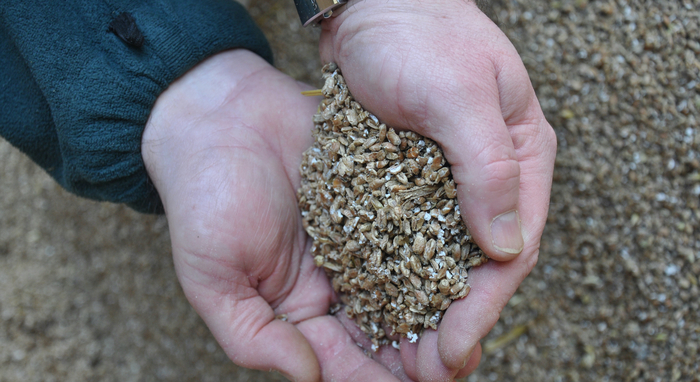With soya bean meal prices soaring, dairy farmers looking for cost-effective sources of feed protein this winter should consider alkalisation of straight cereals.
Rob Smith from FiveF Alka suggests that UK dairy units should always be looking to reduce their reliance on expensive bought-in protein – to both improve enterprise sustainability and cut winter feed costs. And alkalisation of home-grown or bought-in cereals offers milk producers a highly valuable solution, he says.
“Soya bean prices have jumped by £50 per tonne over the last two months and we are getting a lot of calls from farmers worried about the forward cost of bought-in protein balancers,” he says.
“Feed prices are escalating dramatically at the moment, driven by tightening supplies, our weak currency and strong demand from China, so it makes absolute sense to extract as much protein as you can from what you can grow practically on your own farm.
“For example, if you grow a decent wheat crop – as most UK farms can – the grain yield will typically be 4t/acre containing 12% protein. But through alkalisation you can increase this crop’s protein level by 1.46 percentage units for every 10kg of Home n’ Dry mixed in per tonne. This means at the standard inclusion rate of 30kg Home n’ Dry per tonne of cereal you will end up with Alkagrain containing more than 16% (16.38%) protein.”
Mr Smith explains that with alkalisation you are adding some highly cost-effective concentrated protein (via Home n’ Dry pellets) to conserve and enhance the grain during storage. “What’s more, you can treat stored cereals in this way all year round and even increase the Home n’ Dry inclusion rate to boost protein yield still further.
“Once in contact with moisture, the pellets quickly release ammonia into the grain. As well as having an increased protein content, the resultant feed is alkaline. It is also resistant to vermin whilst being stored on farm. Alkalisation also allows dairy farmers to feed more cereal in the ration without triggering acidosis.
“Essentially, this is a dual cash benefit and some farmers are even able to double or triple the standard cereal inclusion rate and still deliver the final feed protein level they require – all without causing any problems for the cow.”
He adds that alkalisation of home-grown cereals can also help dairy farmers reduce their reliance on growing maize, which can be problematical in some areas.


